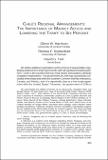Artículo
Chile´s regional arrangements: the importance of market access and lowering the tariff to six percent
Fecha
2005Resumen
We define additive regionalism as the process of sequentially negotiating bilateral free trade agreements with all significant trading partners. Chile is the country that has most clearly articulated a strategy of additive regionalism. The government of Chile has successfully concluded a free trade area with the Southern Common Market (Mercosur), Canada, and Mexico, and it is reportedly close to a free trade agreement with the United States. Moreover, the government of Chile is attempting to add the European Union, the rest of South America, and several other countries to its network of free trade arrangements. Proponents of the government’s strategy point out that if a country were to negotiate free trade agreements with all of its trade partners, it would end up with zero effective tariffs on all imports—or free trade—despite the legal existence of positive most-favored-nation tariffs. In the process, it would also achieve preferential access to its partners’ markets. Absent transition dynamics, this strategy may thus produce gains that are considerably larger than unilateral free trade.
Colecciones
Descargar


